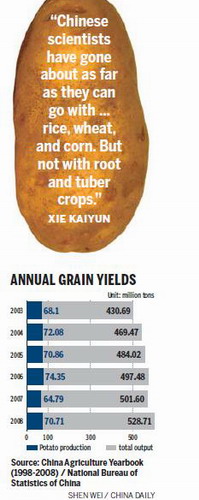Government and Policy
Potatoes are root of the solution
By Jin Zhu (China Daily)
Updated: 2010-06-11 09:02
 |
Large Medium Small |
Beijing - The government is looking at root and tuber crops, especially potato and sweet potato, to ensure adequate food supply for its rising population.
| ||||
Official figures include potatoes in grain output, but only at a weighting of 20 percent. So five tons of potato is treated as one ton of grain.
"Chinese scientists have gone about as far as they can go with the three main crops - rice, wheat, and corn. But not with root and tuber crops," Xie told China Daily.

Total grain yield was 528.71 million tons in 2008, of which rice, wheat and corn accounted for 470.27 million tons, according to the National Bureau of Statistics.
"The room for increasing the production of the three main crops seems limited. In contrast, planting root and tuber crops, especially potatoes, has much more potential," said Xie, also a leading potato scientist at the Beijing office of the International Potato Center.
The advantages of planting potatoes include low requirements of water and land quality, attributes that suit a country which faces severe water shortages and shrinking arable land.
While the country is comfortably ahead of the global average in per unit area yield of the three main crops, it lags behind in potato output.
Wheat yield is 4.61 tons per hectare compared to the world average of 2.76 tons. Per hectare rice and corn yields are 6.38 tons and 5.28 tons, compared to the global average of 3.38 tons and 3.41 tons.

But according to the China Agriculture Yearbook, even though the planting acreage of potatoes in China is around 5.3 million hectares - about a quarter of the world's total - the average output is only 15 tons per hectare, far below 45 tons per hectare in some developed countries.
China produces and consumes more potatoes than any other country largely because of its huge population. But average individual consumption is only one-third of Russia's and two-thirds of the US'.
The government has been stepping up efforts to increase potato production through subsidized pilot programs since 2007.
"By planting improved varieties, the yield in Yulin, Shaanxi province, reached 75 tons per hectare. It is estimated that an average yield of 30 tons per hectare across the country will not be difficult to achieve," Xie said.
In February, the government signed an agreement with the International Potato Center to launch a major research center in Beijing.
"Part of the center's mission is to develop varieties that grow quickly and can adapt to regions throughout China," Xie said.
The State Council announced earlier this year that it would provide subsidies to farmers who grow high-yield seed potatoes.
China faces the big challenge of feeding one-fifth of the world's population on one-tenth of its arable land.
Its population is expected to peak at roughly 1.5 billion by 2030, so the nation needs to produce an additional 100 million tons of food.
Some experts, however, have cast doubts over the popularity of root and tuber crops.
Chen Fan, deputy general secretary of the China Society for Policy Study, said current eating habits show that potatoes cannot replace rice or wheat as mainstays of Chinese cuisine.
"For most Chinese, potatoes are only side dishes like vegetables. People are not accustomed to having potatoes as staple food," he said.


